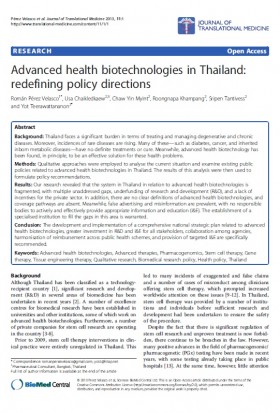This website uses cookies so that we can provide you with the best user experience possible. Cookie information is stored in your browser and performs functions such as recognising you when you return to our website and helping our team to understand which sections of the website you find most interesting and useful.
Advanced health biotechnologies in Thailand: redefining policy directions. (2013)

Details
Advanced health biotechnologies in Thailand: redefining policy directions.
Román Pérez Velasco1*, Usa Chaikledkaew2,3, Chaw Yin Myint2 , Roongnapa Khampang2 , Sripen Tantivess2 and Yot Teerawattananon2*
Abstract
Background: Thailand faces a significant burden in terms of treating and managing degenerative and chronic diseases. Moreover, incidences of rare diseases are rising. Many of these—such as diabetes, cancer, and inherited inborn metabolic diseases—have no definite treatments or cure. Meanwhile, advanced health biotechnology has been found, in principle, to be an effective solution for these health problems.
Methods: Qualitative approaches were employed to analyse the current situation and examine existing public policies related to advanced health biotechnologies in Thailand. The results of this analysis were then used to formulate policy recommendations.
Results: Our research revealed that the system in Thailand in relation to advanced health biotechnologies is fragmented, with multiple unaddressed gaps, underfunding of research and development (R&D), and a lack of incentives for the private sector. In addition, there are no clear definitions of advanced health biotechnologies, and coverage pathways are absent. Meanwhile, false advertising and misinformation are prevalent, with no responsible bodies to actively and effectively provide appropriate information and education (I&E). The establishment of a
specialised institution to fill the gaps in this area is warranted.
Conclusion: The development and implementation of a comprehensive national strategic plan related to advanced health biotechnologies, greater investment in R&D and I&E for all stakeholders, collaboration among agencies, harmonisation of reimbursement across public health schemes, and provision of targeted I&E are specifically recommended.
Full Text: http://www.translational-medicine.com/content/pdf/1479-5876-11-1.pdf




